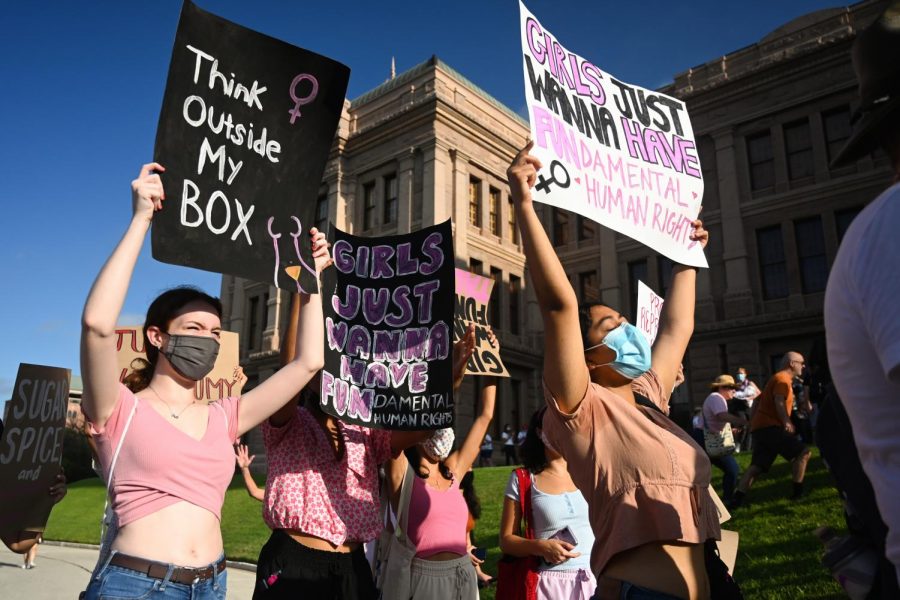UT Students join Women’s March at State Capitol
October 2, 2021
UT students joined about 1,000 protestors in a march to the Capitol on Saturday to oppose Texas’ recent passing of the country’s most restrictive abortion law.
Several UT student protestors voiced that Senate Bill 8 restricts essential reproductive health care at the Austin Women’s March, which began at 9 a.m. and lasted three hours. Senate Bill 8, which prohibits abortions after six weeks without exceptions for rape or incest, took effect in September. The bill also allows citizens across the country to sue anyone who may have assisted a person getting an abortion, including health care providers.
The protest comes a day after a federal judge heard arguments on whether the law should be suspended while courts decide if it’s legal. The judge’s decision is still pending.
Mathematics freshman Holly Luebsen, who led students to the capitol, said she is frustrated with Texas’ implementation of the restrictive abortion bill.
“It’s unsafe, unfair and it’s downright stupid because they don’t know what they’re talking about because they’re men,” Luebsen said. “We’re upset with what’s been happening, and this is the best, most peaceful way to demonstrate how we’re feeling.”
Neuroscience freshman Maya Walker, who has participated in previous student-led reproductive rights protests, said her ultimate hope is for the Supreme Court to codify Roe v. Wade, which would prevent states from passing laws that restrict abortion access.
The most notable effort is the House’s passing of the Women’s Health Protection Act on Sept. 24, which would establish the right to abortions without limitations. However, some protesters, such as Walker, worry the Senate won’t pass the bill.
“Having unity and presenting a voice in a mass way like this, having all of these people come together that believe in a common cause, is really important to demonstrate so hopefully, our representatives listen to us and try and fight for us as well,” Walker said.
Other march speakers included nonprofit organizers and local leaders such as Travis County Judge Andy Brown. Austin City Council members such as Paige Ellis, who passed a resolution Thursday allowing the city to support legal efforts to block the abortion law, also supported the march’s cause. The Women’s March held protests in 660 cities across the country.
Wendy Davis, a former Texas state senator and founder of Deeds Not Words, a women’s rights organization, described the march with one word: resilience.
“It’s your future,” Davis said. “This is the future of young women, of our young trans and non-binary community. Without your voices and your participation, you will likely inherit something that isn’t going to give you the opportunities that you deserve.”
Speakers at the march encouraged attendees to register to vote and sign up to volunteer for the nonprofit organizations there such as Planned Parenthood.
Biology freshman Davionna Byrd said she wants to continue advocacy for reproductive rights by helping foundations and voting Gov. Greg Abbott out of office.
“White men, or men in general, shouldn’t have opinions on a woman’s body at all,” Byrd said. “They don’t understand the struggles of a woman.”
Business freshman Hiba Faruqi held a sign reading “Real change, enduring change, happens one step at a time.”
Other signs read, “Protect my UT-erus, Texas Fight for Women’s Rights” and, “I am a woman, not a womb,” were held by students throughout the crowd.
“People are always like, ‘Why are you marching?’” Faruqi said. “As (Ginsburg) said, ‘Change happens one step at a time.’”



